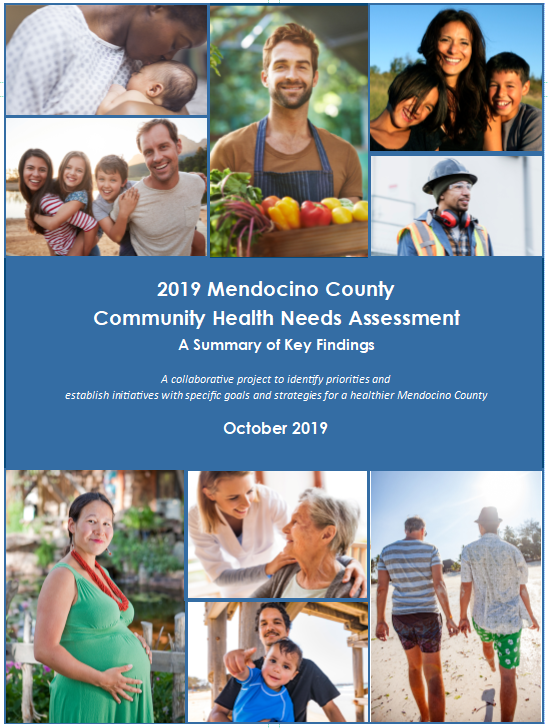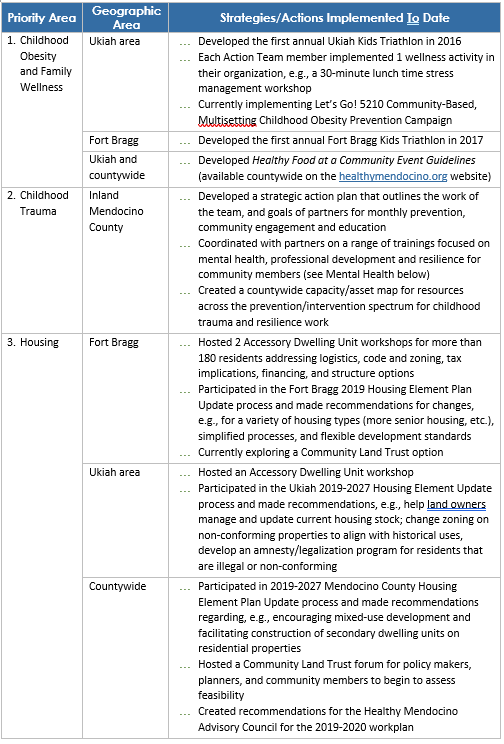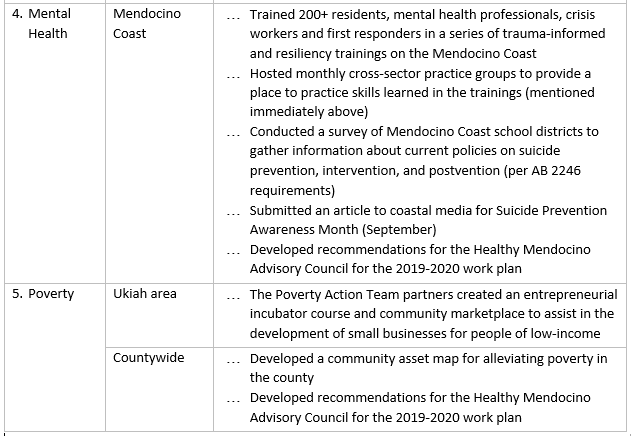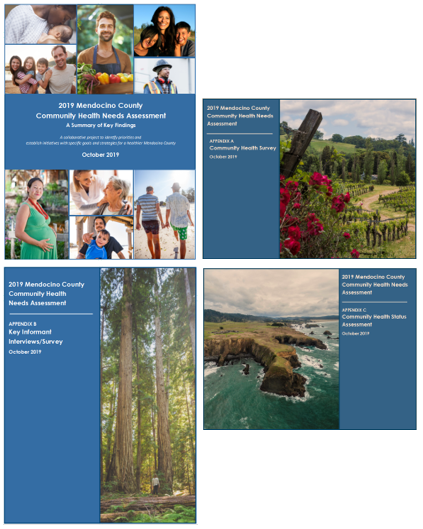
The Community Health Needs Assessment (CHNA) for Mendocino County is a compilation of quantitative and qualitative data from multiple sources, woven together to provide a comprehensive picture of the health of county residents. The 2019 CHNA is the second collaborative CHNA process coordinated by Healthy Mendocino. The first collaborative CHNA was conducted in 2015 and completed in 2016.
Thirteen Mendocino County agencies provided funding and representatives to the CHNA Planning Group to conduct this assessment process beginning in 2018. They were: Adventist Health Howard Memorial, Adventist Health Ukiah Valley, Alliance for Rural Community Health & Community Health Resource Network, Community Foundation of Mendocino County, FIRST 5 Mendocino, Healthy Mendocino, Mendocino Community Health Clinics, Mendocino County Health & Human Services (Agency), Public Health Branch, North Coast Opportunities, Partnership HealthPlan of California, Redwood Community Services, Inc., Redwood Quality Management Company, and United Way of the Wine Country.
The purpose of the Community Health Needs Assessment process is to identify the most pressing health priorities facing Mendocino County residents and commit to a coordinated set of strategies to improve the health and well-being of our residents. (The priority areas identified in the 2019 CHNA are: Mental Health, Domestic Abuse and Substance Abuse. See below for more information on each priority). While many agencies and organizations in Mendocino County collect and act on health information, this process was distinct because it was community-driven, with several local agencies collaborating on a single Community Health Needs Assessment. The purpose of collaborating is to achieve a greater combined impact on local health than the partners could achieve separately. In addition to being more efficient, this collaboration makes it possible to involve a wide array of community members and local public health system partners (e.g., hospitals and clinics) in efforts that are designed to be sustainable.
Many community members, key formal and informal leaders, and community partners shared their wisdom, knowledge, experiences, and perceptions about the health of residents and the capacity of the health care system to provide essential public health services.
The CHNA findings will be used to inform the prioritization of health issues and the development of a Community Health Improvement Plan (CHIP). A CHIP is an action-oriented plan for addressing the most significant issues identified by community partners.
The goal of the CHNA and CHIP is to align and leverage resources, initiatives and programs to improve local health. The ultimate goal is to ensure coordinated and measurable health improvement throughout the county, with all agencies and organizations working together toward collective impact.
At the conclusion of the 2015 CHNA process, a countywide forum with over 100 community members from across Mendocino County was held in 2016 to choose a set of priorities. As a result of the forum, a CHIP was formed with five priority areas:
- Childhood Obesity and Family Wellness
- Childhood Trauma
- Mental Health
- Housing
- Poverty
Healthy Mendocino facilitated the formation of Action Teams in two of the five geographical regions of the county, Inland Ukiah/Anderson Valley and North Coast. Each Action Team was formed with a variety of key stakeholders including health and human service agency employees, educators, farmers, healthcare workers, recreation department employees, lawmakers, residents, government employees, and other groups interested in working towards the health and well-being of Mendocino County. Each of the Action Teams subsequently developed goals, objectives/measures, key strategies, and an action plan. They have been working diligently for 3 years on their goals and were able to implement strategies and actions as seen in the Table below.
Strategies/Actions Implemented by Action Teams
Since the 2016 CHNA


The CHNA Planning Group met at least monthly from September 2018 to September 2019 to provide guidance and feedback on the proposed methodologies for each of the assessments utilized during the process and to evaluate the findings. The data collection methods are described below.
- The Community Health Survey (Appendix A) provides residents’ opinions about health status, access to services, and any barriers to obtaining health care. A total of 1,324 residents completed the Community Health Survey; 1,276 were completed in English and 48 in Spanish; 94 were completed by Native Americans, mostly from the Round Valley area.
- The Key Stakeholder Interviews/Key Leader Survey (Appendix B) identifies views on health and well-being in Mendocino County among key stakeholders in the community, both formal and informal leaders. Thirty-four key stakeholders in the community were interviewed, including representatives of county and city government, private businesses, health and human services, hospitals and clinics, community-based organizations and nonprofits, law enforcement, children and youth services, education, media, geography, and racial/ethnic groups, among others. Interviews were conducted in person or by phone. A Key Leader Survey of 56 formal and informal leaders in the community was provided online.
- The Community Health Status Assessment (Appendix C) uses secondary data from a variety of sources such as vital statistics data, accident and injury rates, infectious and chronic disease rates, and others, to illuminate the health status of Mendocino County and its residents, helping to answer questions including, What is the health of Mendocino County residents?
Further information on each of the assessments described above can be found in the Appendices: Community Health Survey (Appendix A), Key Informant Interviews/Survey (Appendix B), and Community Health Status Assessment (Appendix C).
To define a starting place for discussion and planning for collective action to improve community health, the CHNA Planning Group examined and prioritized the CHNA data according to the themes and issues that emerged from the Community Themes and Strengths Assessment and the Community Health Status Assessment. The Community Health Survey (Appendix A), the Key Leader Interviews/Survey (Appendix B), and the Community Health Status Assessment (Appendix C) were examined separately, then collectively.
Using this method, the CHNA Planning Group identified the following issues based on the analysis of the primary and secondary data sources as leading Community Health Needs / Priorities in Mendocino County:
- Mental Health
- Domestic Abuse (including sexual and child abuse)
- Substance Abuse (including drugs, opioids, and alcohol)
The findings of the 2019 Community Health Needs Assessment contained in this report and its appendices provide a great deal of information to support the selection of strategic issues for collective impact efforts. The CHNA Planning Group recommends the three aforementioned Community Health Needs / Priorities as a starting point in the discussion and prioritization of health issues. The final priorities and action plans will be determined by the Healthy Mendocino Advisory Council, which is made up of key agency leaders and will be convened in November 2019. Further planning and prioritization will occur at that time.
While the Healthy Mendocino will focus on specific arenas for collective action, there are many ways to improve community health. All community members are encouraged to use the information provided in this document to help enhance wellness and quality of life in Mendocino County.
For more information, give feedback or to get involved with the issues identified in the report,
please email healthymendocino@ncoinc.org

